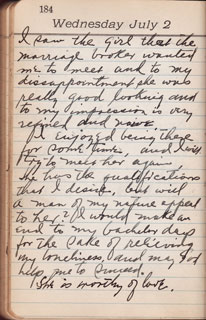
I saw the girl that the
marriage broker wanted
me to meet and to
my dissappointment she was
really good looking and
to my impression is very
refined and naive.
I enjoyed being there
for some time, and I will
try to meet her again,
She has the qualifications
that I desire, but will
a man of my nature appeal
to her? I would make an
end to my bachelor days
for the sake of relieving
my loneliness, and may God
help me to succeed.
She is worthy of love.
————–
Matt’s Notes
I first asked my mother if I could borrow Papa’s diary back in Thanksgiving of 2006, and when she brought it to the table my sister picked it up, opened it, and read this passage out loud. It was my first look at the diary in about 20 years, and it certainly dispelled any question of whether Papa’s writing was as compelling or poignant as I remember.
The real surprise of this entry is the unexpected sharp turn it takes in the first paragraph: “To my disappointment” followed by “she was really good looking” and an array of other compliments. It’s an incongruous, surprising phrase. Why would he be disappointed to meet such a desirable woman through his marriage broker? The sentiment becomes clear a few lines later when we realize Papa feared he was not in her league. It’s reminiscent of his early doubts about the 20th Century Girl, when he wrote “But have I the right as a wage earner to propose to a girl like her?” and “has a poor dog [like me] a chance? Is a girl even of her type ripe enough to see my qualities, and truly love me despite my poor standing?”
Could Papa’s previously established distaste for the marriage broker (a.k.a. “shadchan“) have its roots less in his rejection of such a mercenary approach to romance (as I have posited) and more in his reluctance to see himself through the eyes of a prospective wife and find himself wanting? Does he fear his own tendency to idealize “naive” and “refined” women with the “qualifications” he desires, to see them as unattainable, towering presences, to embark, with each crush, on a Cyclonic roller coaster ride of infatuation and doubt and disappointment?
Whatever the reason, the confused and urgent pattern of this entry hints at some inner turmoil. She is attractive and well-qualified; he is not worthy; he would like to put an end to his loneliness; he prays to find someone who might help him. He seems to lose track of the woman he’s met as he goes through these ideas, as if he’s thinking more of what she represents, what she says about his need to marry, to raise a family, than who she really is.
But finally, he tells us, “she is worthy of love.” This assertion, and the way he delivers it, could not be more sad or perfect. It embodies everything he’s going through at once: all his doubt, all his need, all his bewilderment, all his abstraction, all his desire, all his hope. It is absolute; it is tentative. It is the declaration of a man who knows where his path leads but wonders, desperately, if someone will ever help him find where it starts.